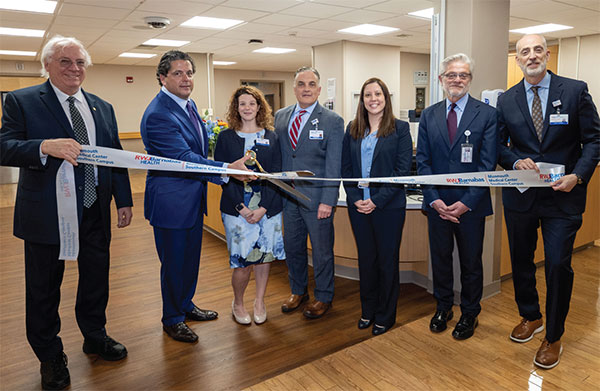New models of compassionate care recognize how past events affect health and behavior.
How do you respond to someone who exhibits difficult or nuisance behavior? This question is at the heart of the behavioral health training offered at RWJBarnabas Health (RWJBH).
The training educates staff on a patient approach called trauma-informed care, whose goal is to increase understanding, compassion, empathy and connection with patients, especially those who have experienced trauma and are struggling with mental illness.
“Trauma-informed care is a paradigm shift in how we treat and collaborate with patients,” said Nicole Pawasnik, MSN, RN, NEA-BC, CEN, chief nursing officer at RWJBH Behavioral Health Center in Toms River, who is leading the effort system-wide. “It’s about building relationships and showing patients that we’re in this together.”
This new approach is expected to not only ensure patients receive the medical and behavioral health services they need, but also help staff manage the stress, fatigue and emotional impacts that can result from providing care.
Flip the script
Trauma-informed care flips some approaches common in traditional models of care. “The traditional approach is that healthcare providers are the authority and they know best,” Powasnik says. “But that approach doesn’t meet people’s real-life situations and is often ineffective for people who have been traumatized.”
Trauma is important because it is common among patients and can impact both health and behavior. “Trauma can be caused by one event, a series of events, or a set of circumstances that are threatening or harmful,” Powasnick says. “Trauma can have lasting effects on a person’s physical, emotional, or mental health and ability to function.”
The causes of trauma are many and varied, including sexual abuse, natural disasters, violence and childhood neglect, “but each person experiences and responds to trauma in different ways,” she said.
People affected by trauma have a harder time forming healthy relationships, they may find that behaviors that previously helped them cope with things hurt others, and “they often end up in poorer health than people without trauma,” Powasnik says.
When health care becomes trauma-informed, health care providers recognize the far-reaching effects of trauma, understand potential pathways to recovery, recognize the signs and symptoms of trauma, and integrate this knowledge into policies, procedures, and practices that avoid re-traumatizing people.
Trauma-informed care differs from traditional approaches in the following ways:
- Prioritize collaboration over control
- View negative behaviors as existing for reasons that need to be understood, not simply stopped
- Prioritize learning emotional management skills rather than eliminating negative behaviors
- See relationships, not rewards and punishments, as the primary driver of change
- Act as a collaborator, not as an authority or expert
- Expect to be affected by emotions that need to be discussed and managed, and don’t strive to be invincible or view emotions as unprofessional or weak.
Practicing trauma-informed care can help de-escalate tense interactions and help health care providers realize they don’t need to take a patient’s behavior personally. “If you recognize that someone is behaving this way because of something that happened in their past, you can respond in a different way that builds rapport and lets the patient know you’re here to help, not the enemy,” Powasnick says.
Critical Training
This new initiative marks a major step forward for RWJBH Behavioral Health Services, a leading provider of integrated mental health and substance abuse treatment services that, in partnership with Rutgers University Behavioral Health Care, serves more than 500,000 people annually.
RWJBH’s trauma-informed care training began at the Behavioral Health Center and is now being implemented at the behavioral health services at Trinitas Regional Medical Center in Elizabeth and Jersey City Medical Center, with training also planned at Monmouth Medical Center in Long Branch and Clara Maass Medical Center in Belleville, with additional locations and service lines planned in the future.
Staff trained in trauma-informed care can easily see how it benefits both patients and providers.
“The typical feedback I receive after the training is, ‘Wow, this has opened my eyes and makes so much sense,'” says Jayme Basil LCSW, therapist at the Behavioral Health Center’s Stepping Stones outpatient program. “The new approach is not, ‘What’s wrong with you?’ but, ‘What happened to you?’ It helps people understand that if someone is acting the way they are, it’s because that’s what they know and they’re doing their best.”
Basile has also found that this approach reduces vicarious trauma for staff — “It helps prevent them from getting burned out,” she says, and she prioritizes monthly self-care sessions where staff can talk about their problems.
“Trauma-informed care may be the most important training we’ve ever provided,” Powasnik said. “Once you learn it, you can’t stop.”

The March 4 dedication ceremony for the new medical/behavioral specialty unit at Monmouth Medical Center South Campus (MMCSC) included (from left) Lakewood Mayor Raymond Coles, RWJBarnabas Health (RWJBH) President and CEO Mark E. Manigan, RWJBH Behavioral Health Center Chief Nursing Officer Nicole Pausnick, Monmouth Medical Center (MMC)/MMCSC Chief Administrative Officer Dr. Philip Passes, MMCSC Chief Nursing Officer Mabel LaForgia, RWJBH Senior Vice President of Behavioral Health Services and President and CEO of Rutgers Behavioral Health Care Dr. Frank Ghinassi, and MMC/MMCSC President and CEO Eric Carney.
New Unit for Medical and Behavioral Care
In March, Monmouth Medical Center Southern Campus (MMCSC) announced the opening of a new Medical/Behavioral Specialty Unit dedicated to the comprehensive care of patients with behavioral health needs. The unit will provide secure care for hospitalized adults with both medical and psychiatric illnesses.
Located in a secure, restricted-access area of the hospital, the eight-bed unit is staffed by a dedicated team of nurses, clinical care technicians and mental health personnel trained in both medical/surgical and behavioral health care.
Mental illness is one of the most common health conditions in the United States, and underlying conditions such as heart disease and diabetes that require specialized care often go untreated due to behavioral health issues.
“We are excited about this opportunity to provide excellent care to those who need it most in our community and across the RWJBarnabas Health system,” said Dr. Philip Passes, chief administrative officer, Monmouth Medical Center/MMCSC.
Learn more about RWJBarnabas Health’s behavioral health services.



 View all issues of Healthy Together magazine by New Jersey region:
View all issues of Healthy Together magazine by New Jersey region: